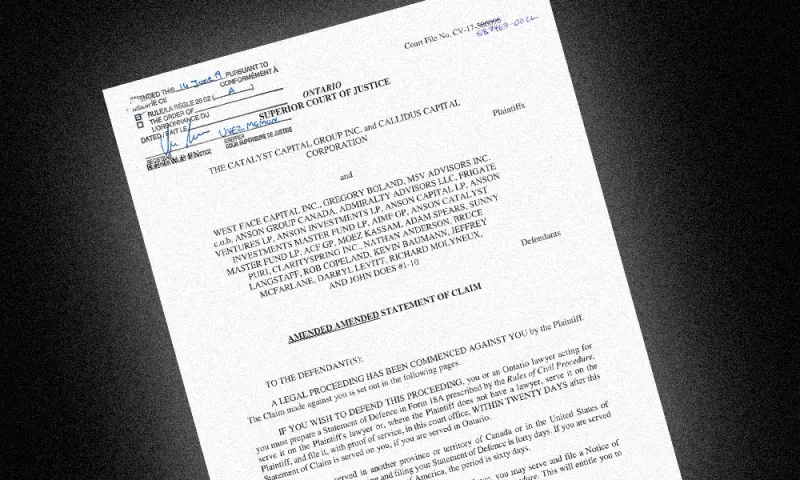
Illustration by II
Secret Dropbox folders, a negative Twitter campaign, and an exclusive dinner for short-selling “conspirators” are all tactics alleged by Canadian private equity firm Catalyst Capital Group against rival firm West Face Capital and a slew of other defendants, according to the latest filing in a long-running legal campaign.
The updated filing alleges that, using alter egos on Twitter, one or more of the defendants published “false statements” about Catalyst and its CEO Newton Glassman — calling its publicly traded lender Callidus Capital Corp.’s financial statements a “sublime works of fiction,” saying Catalyst is “another likely fraud that Canadians should watch out for” and the “Mozart of misleading disclosure,” and that Glassman is “Canada’s Madoff.”
Thus far, Catalyst has been unsuccessful in its legal battles against West Face, which Catalyst has accused of using its confidential information to win a bid for a distressed company’s assets and conspiring with others to drive down the stock price of Callidus. Of the four lawsuits Catalyst has filed against West Face, courts ruled in West Face’s favor in two cases — with a judge calling one lawsuit an “abuse of process” by Catalyst — while the other two matters are ongoing.
West Face filed a counterclaim of its own against Catalyst, accusing it of carrying out a defamation campaign against it and its CEO, Gregory Boland, and alleging that intelligence firms Black Cube and the now-defunct Psy Group participated in the campaign.
Catalyst alleged in a November 2017 lawsuit against West Face that it and a “wolfpack” of conspirators — including fund managers, several Callidus borrowers who had defaulted on their loans and were facing the enforcement of personal guarantees against those loans, and a Wall Street Journal reporter, among others — operated in concert to file “false whistleblower reports” alleging fraud at Callidus with Canadian and U.S. securities regulators, and to plant negative news stories based on those reports in order to drive down its share price so that they could short the shares at a profit.
The private equity firm alleges that this shared information included a “highly confidential” list of Callidus’s borrowers and loan accounts and other private Callidus documents that it claims contained material non-public information.
“Some or all of the Defendants also used encrypted and self-destructing message applications, such as ‘Confide,’ to communicate in an effort to avoid leaving any trace of their activities,” Catalyst’s updated complaint further alleges.
The firm also alleges that after a meeting between one of the defendants and a U.S.-based short seller, the short seller declared the meeting to be “a perfect meal after a great day with members of the conspiracy.”
Catalyst declined to comment on the updated filing.
However, a source close to the firm said the new claims are based on documentary evidence produced by court order or as part of discovery, including emails, texts, and other communications.
In its counterclaim against Catalyst, filed in December 2017, West Face said it had not been short Callidus’s stock since April 2015, more than two years before the alleged short-and-distort campaign took place.
Callidus’s share price has fallen by nearly 97 percent since its IPO, following two straight years of losses totaling C$400 million ($299 million).
West Face alleged in that 2017 filing that Black Cube, which had been hired as a subcontractor by a security firm Catalyst had retained, ran sting operations on several of its current and former employees — and carried out a separate operation on a retired judge who had earlier ruled against Catalyst, in an attempt to induce him to say something that would prove he was biased when he made his decision.
That claim also accused Psy Group and its operatives of disseminating “false and defamatory” information about West Face and Boland.
Black Cube could not be reached for comment by the time of publication, but said in a statement of defense to West Face’s counterclaim that it denied the allegations against it in the counterclaim. It added in the filing that there was “no legal prohibition” against its conduct on behalf of Catalyst and Callidus, and that it is “a matter of public record” that its agents or employees met with various people in an attempt to solicit information that could have been helpful to Catalyst and Callidus in its litigation.
“West Face has reviewed Catalyst’s updated claim and continues to believe that Catalyst’s claims are without merit,” the firm said in a statement to Institutional Investor. “West Face did not participate in any conspiracy involving Callidus and did not short sell Callidus shares during the period alleged by Catalyst. Any damage suffered by Callidus is solely the responsibility of Catalyst and Callidus management. West Face looks forward to defending these claims, and pursuing its own counterclaim on the Black Cube and Psy Group matters, in open court.”





